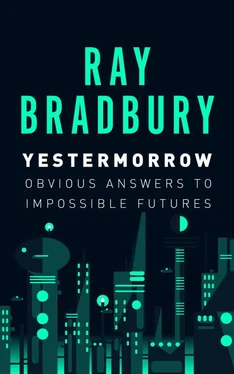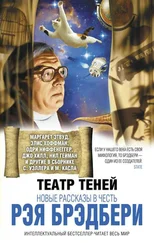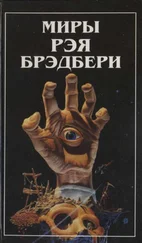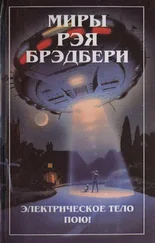Some nights, or days, you come for the Restaurant Maze,
Or the Wild Experiences.
Or merely shop.
Choose or Mix. Then go home with a new Psyche in your blood.
As for me, I’ve just read all I’ve written. Exhausted, I think I’ll lie down!
1990
A FEASTING OF THOUGHTS, A BANQUETING OF WORDS
Ideas on the Theater of the Future
Imagine a room with 40 men and women seated with empty chairs on either side of them. Eighty chairs in all, but only 40 occupied. It is a robot’s banquet in the year 2010, and I have been invited.
I enter and am greeted with a chorus of voices. The men and women at the tables raise their glasses to me and call out.
“Here, no here, here, no here!”
And I sit now with Plato, now with Aristotle, now with Emily Dickinson, in a great feasting of thoughts and a banqueting of words.
“Dear Mr. Bradbury!”
Plato seizes my hand briskly.
“Sir,” I say. “How goes it with your Republic?”
“Do you really want to know?”
“Of course. How does this whole place work? The company of poets. The room of artists. The museum of philosophy. The corridor of history—?”
“Enough! You have asked much, allow me to make a brief response. Not long ago a boy, quite small, but very curious, came here. His journey makes a fine small tale.”
“I’m ready,” I say.
“Well then. The boy ran through the Robot Museum of Time and Place and thought and stared in at that door marked, Greece.”
There, far across a moonlit plain, under a big tree, breaking bread and drinking wine, sat three old men in white robes. They waved.
The boy approached their table, carefully. He listened to the gentle hum of their hidden machineries, and said:
“Shouldn’t I be afraid of you? People say: machines dehumanize people. Yes?”
“People say,” Plato laughed gently. “Sit down, boy. Join us in a… Dialogue. Do we look as if we might corrupt people with our cogs, wheels, and electric circuits?”
“Well…”
“Two thousand years ago,” said the Aristotle robot, “simple machines stood before our temples. Coins, put in those machines, dispensed holy water. Even then we said, what other miracles, strange or terrifying, might be born of science.”
“And,” said the third man, Socrates, “new miraculous machines were born over the years.”
“And were they bad or good?” asked the boy.
“Neither. In between. Like animals, machines know not themselves. So you cannot blame or praise a machine.”
“Yet people do,” said Plato. “Men have always feared new ideas arriving, especially when they jump up in three-dimensional forms, devices that move and do things by themselves.”
“Reconsider, Plato. Are there no machines in the long history since we were born and died and are reborn again as robots speaking truths, are there absolutely no machines one can call evil, or saintly?”
“None.”
“None?” asked the boy.
“None and more than none. From the time of our Apollo god to the time of your Apollo rockets, boy, no machines deserved to be tried, found guilty, named murderer and destroyed.”
“But some folks—”
“Yes, some folks revile and loathe, abhor and shudder at the very thought of machines that ‘think.’” But ours are borrowed thoughts, boy. We do but speak old breakfast truths at lunch. We are electric sparrows that peck at ancient bread crumbs. People ask the wrong questions. Ask not if this machine is evil or good, but if this machine or that teases some men to do evil or good.”
“Can machines make men do things?”
“Not really, no. Men have free will, do they not?”
“I had always supposed so.”
“Nevertheless, machines tempt men. They are the Snake and the Apple in this modern garden world. By simply existing, machines provoke.”
“For example?”
“Well, look at those millions of chariot cars, drawn up at the curb. They cloud the air with heavenly vapors. They charge the wind with power. They call all young men to connive in their own destruction. So off they leap and roar away. Is the machine guilty when they die?”
“No, man-plus-machine is guilty,” said Aristotle.
“Sadly true. And the machine, by simply standing as a fair woman stands unknowing in the marketplace, demands action. Men give to the machine what it lacks, impulse and will. Together they spell doom.”
“Machines then can, by their design, their color, their shape, their idea, lead us astray?”
“Was Eve’s apple evil? No. But eating it was. The car is not evil. But driving that same car when filled with fermented grain is self-murder most foul.”
“If, by their design, some machines tempt us, doesn’t it follow that other machines, differently designed, will hold to the Golden Mean?”
“We are such machines.”
“Vanity, Plato, vanity. Are we never wicked?”
“We could be programmed for wickedness, to teach the immoral and the debauched. But good men have tinkered with our electro-magnetic gizzards. Our sound tripes are excellent. We keep the best. We speak wisdom. We promote humanity.”
“But we are not wise in ourselves?”
“The men who built us are wise. They set the first example. We set the second example by existing. All those who listen and follow us set the third. Together, we make a common race slowly rising to, rather than away from, the sun.”
“If this is true, why then do people cry out against machines and not the men who use them to bad ends?”
“It is the same impulse that makes one damn the racket when the shuttlecock behaves poorly on the summer air, or blast the turf when the golf ball veers. We are the recipients of wrath, dear Aristotle, because we stand in the midst of events. We machines move, often, when man himself stands still. We are an impulse that simulates life. Don’t be surprised if the curses that are hurled at the automobile sometimes ricochet off and strike us. Each and every machine is a teacher, is it not, simply by being an idea in motion? The car teaches power and speed as well as exhilaration. The rifle teaches destruction. The hydrogen bomb teaches, ironically, Christian principles. By its very size it says: Everyone sit down! In the midst of all this, we and other machines go about the fields of cities, toiling and spinning.”
“What other machines lean us toward light rather than dark, Plato? Let us make a list.”
“Motion picture projectors, tape recorders, radios, records, television, each speak books when books are not present but, better, turn us around to books if books we have never tried.”
“The camera, then, is a simple machine that does vast things?”
“By taking proper pictures, yes, it dissolves the flesh of three billion people to make us all one. By showing us the great Earth from Space, it proves we are one race of many fantastic parts, each needful of the others’ survival, each wanting to know the other. And now the time of knowing is at hand, and we splendid, huge new Toys are here to help the knowing. Right, boy?”
“I—” said the boy.
“In sum, fear not machines but men. And fear not men but merely half-educated men. To those we must add a half of ourselves, hoping to make one creature of two parts. Man joined to woman makes marriage. Mind joined to mind flints ignorance on ignorance, erodes prejudice, and fires the hearth where all may sit to warm hands and minds. Well then, boy, how do you like our answers?”
“Swell!” said the boy.
“Do you recall in my Dialogues I speak of men living each in his own cave, looking upon dim walls to see shadows of the outside world, each guessing what that truth may be? Well, boy, we are the new shadows, played not only on walls for men to guess, but as shapes that walk and may be touched. Time’s up. Goodbye. Run, boy, run.”
Читать дальше











